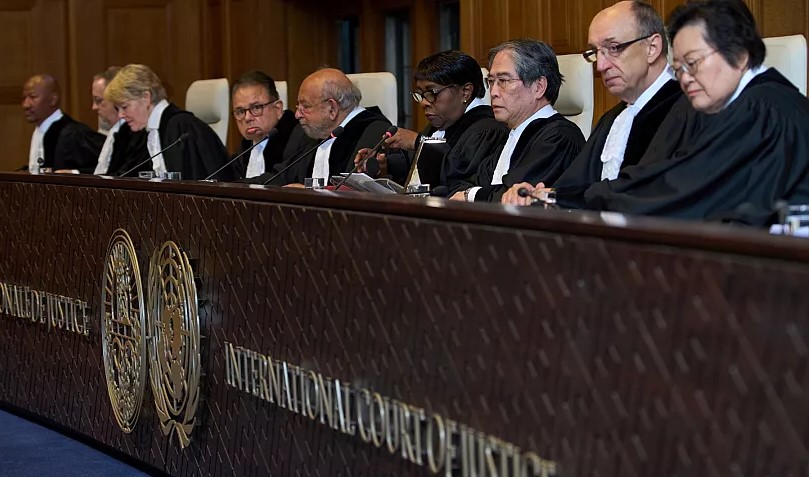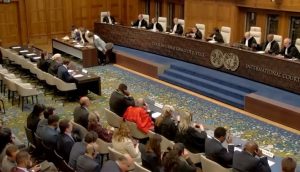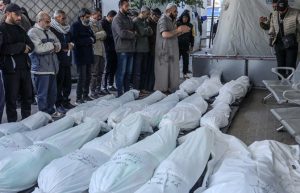Palestinian Envoy Accuses Israel of Targeting Civilians and Aid Workers at UN Court
3 min read
UN court hears allegations against Israel amid escalating humanitarian concerns in Gaza.
The conflict in Gaza reached another global platform this week as a Palestinian diplomat accused Israel of committing serious violations of international law, including targeting civilians and obstructing humanitarian aid. The statements were delivered at the International Court of Justice (ICJ) in The Hague, during hearings that Israel dismissed as politically motivated and part of a campaign to delegitimize the country.
Israel, which denies deliberately harming civilians or aid workers, chose not to attend the hearing. The case was initiated following a request by the United Nations General Assembly last year, asking the court to provide a legal opinion on Israel’s responsibilities in the occupied Palestinian territories. The opinion, although advisory and non-binding, is considered legally influential and could impact international diplomacy.
Ammar Hijazi, the Palestinian Ambassador to the Netherlands, addressed the court on Monday. He accused Israel of systematically starving, killing, and displacing Palestinians in Gaza. Hijazi also said that humanitarian organizations attempting to deliver aid were being deliberately blocked or targeted.
“Israel is not only responsible for mass suffering but is also obstructing those trying to save lives,” Hijazi said, calling the situation a blatant violation of international humanitarian law.
At the heart of the case is Israel’s decision to bar the U.N. Relief and Works Agency for Palestine Refugees (UNRWA) from operating in its territory. The General Assembly, through a resolution led by Norway, requested the ICJ’s opinion on whether Israel is legally obligated to allow the unimpeded delivery of humanitarian aid to Palestinian civilians.
As the court began its hearings, the humanitarian situation in Gaza continued to deteriorate. Since early March, Israel has restricted the entry of essential supplies such as food, medicine, and fuel into the enclave. The World Food Program recently confirmed that its food stocks in Gaza had been depleted, leaving hundreds of thousands of Palestinians at risk of starvation.
Despite a brief ceasefire, Israeli airstrikes resumed on March 18. Israel says the military campaign is aimed at pressuring Hamas to release hostages. Meanwhile, ceasefire negotiations remain stalled.
The ICJ hearings began with presentations by the United Nations and Palestinian representatives. A total of 40 countries and four international organizations are expected to participate. The United States, which opposed the U.N. resolution, is scheduled to present its views later in the week.
Legal experts emphasize that the ICJ’s advisory opinion, while not enforceable, could carry significant weight in shaping international law and public discourse. “These opinions clarify state responsibilities and can influence both diplomatic and legal actions,” said Juliette McIntyre, a legal scholar from the University of South Australia.
Israel, on the other hand, has strongly condemned the proceedings. Foreign Minister Gideon Saar criticized the U.N. and its agencies, accusing them of using international law to undermine Israel’s right to self-defense. “The U.N. and its institutions are being weaponized against the most attacked country in the world,” Saar said at a press conference.

On Tuesday, South Africa—a vocal critic of Israel—will present its own arguments. The country is also involved in a separate ICJ case accusing Israel of committing genocide in Gaza, an allegation Israel has rejected.
Israel’s dispute with UNRWA intensified after it banned the agency in January. Israeli officials argue that the organization has been infiltrated by Hamas, citing intelligence that some staff participated in or supported the October 7, 2023, attack that killed around 1,200 people in Israel. UNRWA, which was established in 1949, denies institutional wrongdoing but dismissed nine employees following an internal investigation.
Although the ban doesn’t apply directly to Gaza, Israel’s control of border access severely limits UNRWA’s ability to operate. Israeli authorities say they are seeking alternative aid delivery channels that do not involve the U.N.
UNRWA continues to provide essential services to over 2.5 million Palestinians across Gaza, the West Bank, and East Jerusalem, and millions more in neighboring Arab countries.
Since the war began, Gaza’s Health Ministry has reported more than 51,000 Palestinian deaths, including many women and children. Israel says it has killed approximately 20,000 militants, though it has not presented detailed evidence.








